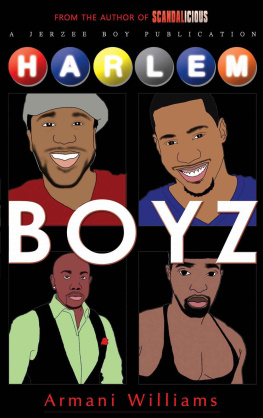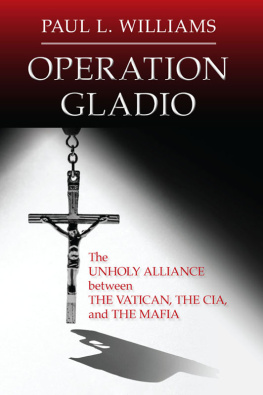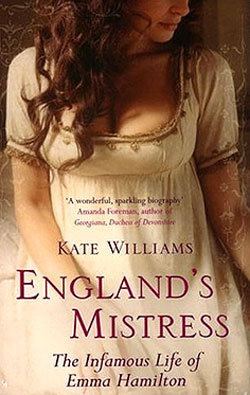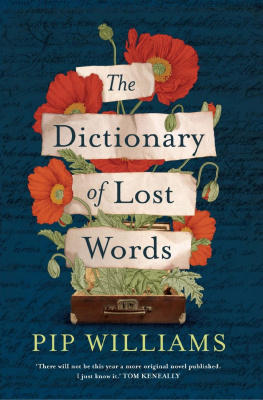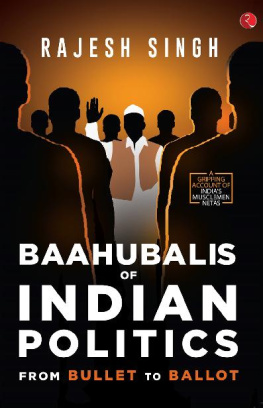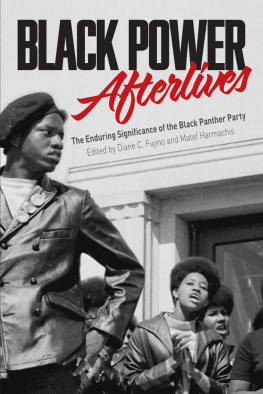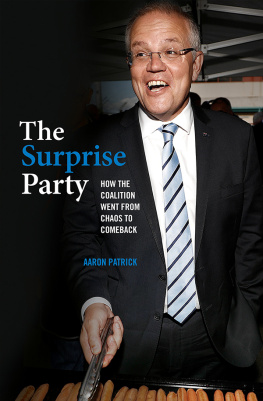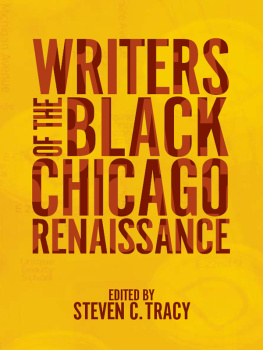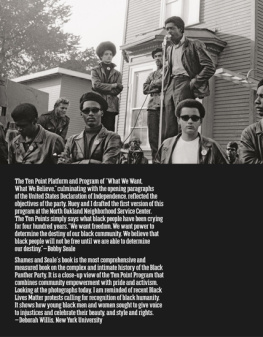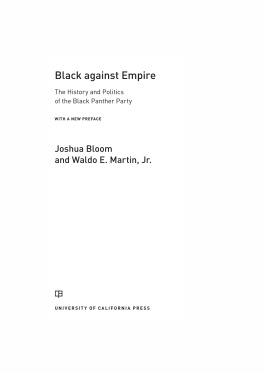FROM THE BULLET TO THE BALLOT
THE JOHN HOPE FRANKLIN SERIES IN AFRICAN AMERICAN HISTORY AND CULTURE
Waldo E. Martin Jr. and Patricia Sullivan, editors
This book was published with the assistance of the
John Hope Franklin Fund of the University of North Carolina Press.
2013 The University of North Carolina Press
All rights reserved
Set in Charter ITC, theSans, Champion by codeMantra
Manufactured in the United States of America
The paper in this book meets the guidelines for permanence and durability of the Committee on Production Guidelines for Book Longevity of the Council on Library Resources.
The University of North Carolina Press has been a member of the Green Press Initiative since 2003.
Portions of Chapters 2 and 3 appeared previously in somewhat different form in Dont no woman have to do nothing she dont want to do: Gender, Activism, and the Illinois Black Panther Party, in Black Women, Gender and Families, Fall 2012. Copyright 2012 by the Board of Trustees of the University of Illinois. Used with permission of the University of Illinois Press.
Library of Congress Cataloging-in-Publication Data
Williams, Jakobi.
From the bullet to the ballot : the Illinois Chapter of the Black Panther Party and racial
coalition politics in Chicago / by Jakobi Williams.
p. cm.(John Hope Franklin series in African American history and culture)
Includes bibliographical references and index.
ISBN 978-0-8078-3816-7 (cloth : alk. paper)
1. Black Panther Party. Illinois Chapter. 2. Black powerIllinoisChicagoHistory
20th century. 3. African AmericansIllinoisChicagoPolitics and government
20th century. 4. African AmericansCivil rightsIllinoisChicagoHistory20th
century. 5. Civil rights movementsIllinoisChicagoHistory20th century.
6. Hampton, Fred, 19481969. 7. Chicago (Ill.)Politics and government1951
8. Chicago (Ill.)Race relations. I. Title.
F548.9.N4W55 2013
323.1196073077311dc23
2012028588
17 16 15 14 13 5 4 3 2 1
For my grandmother Louella Smith;
my family Cassandra, Surayya, and Amari;
and Joseph A. Brown, S.J., Ph.D.
CONTENTS
Acknowledgments
Abbreviations and Acronyms
INTRODUCTION . The Illinois Chapter of the Black Panther Party Speaks for Itself
ONE . The Political and Social Climate of Black Chicago, 19001970
TWO . The Illinois Chapter of the Black Panther Party
THREE . Chicago and Oakland: A Comparative Analysis of the Illinois Chapter of the Black Panther Party and National Headquarters
FOUR . The Original Rainbow Coalition
FIVE . Law Enforcement Repression and the Assassination of Chairman Fred Hampton
SIX . The Legacy of the Illinois Chapter of the Black Panther Party
Notes
Bibliography
Index
ILLUSTRATIONS
Bobby Seale, Masai Hewitt, and Don Cox at a secret meeting with Fred Hampton and Bobby Rush, 1969
Fred Hampton in T-Shirt at ILBPP headquarters, 1969
Fred Hampton, accompanied by members of the Young Lords, speaking to college students, UIC , 1969
ILBPP free breakfast program, male members serving children, Chicago, 1969
ILBPP members Ronald Doc Satchel, Fred Hampton, and Bobby Rush posing with poster indicating the groups opposition to the arrest of Bobby Seale during the Chicago Eight trial, 1969
Ann Campbell, Communications Secretary, ILBPP , 1969
Christina Chuckles May, Deputy Minister of Culture, ILBPP , 1968
The original Rainbow Coalition at a press conference on April 4, 1969, calling for interracial unity one year after the assassination of Martin Luther King Jr.
Field Marshall Bob Lee, ILBPP , organizing Appalachian white migrants during a community meeting in Uptown, 1968
Bill Preacherman Fesperman, Fred Hampton, Bobby Rush, and Lamar Billy Che Brooks at Rainbow Coalition rally at band shell in Grant Park, 1969
Young Patriots outside their Free Health Clinic, 1969
Free Health Clinic, Uptown Chicago, 1969
Free Health Clinic, Uptown Chicago, 1969, child with Dr. Valise
Jos Cha Cha Jimnez, 1969
Young Lords demonstrate in support of Pedro Medina, 1969
RUA Free Health Clinic, 1969
RUA breakfast for kids, 1969
Aftermath of police raid on ILBPP headquarters, October 1969
Fred Hampton at Dirksen Federal Building in Chicago, October 1969
Fred Hampton lying in state, December 1969
Convict Hanrahan billboard, 1972
Peace march against police repression, 1970
Chicago mayor Harold Washington and Jesse Jackson celebrating Washingtons victory, 1983
MAPS AND FIGURES
MAPS
1. South Side Black Belt
2. West Side Communities with Changing Racial Demographics, 19501970
3. Chicago Freedom Movement Open Housing Targets, 1966
4. Original Rainbow Coalition Locations
FIGURES
1. Political Groups That Worked in Coalition with the ILBPP , 19681974
2. Colleges and Universities That Housed ILBPP Representatives
3. The Original Organizations of the Rainbow Coalition
ACKNOWLEDGMENTS
This project would not have been possible without the participation of the many former members of the Illinois chapter of the Black Panther Party and its affiliates and the progressive community of my hometown of Chicago. I dedicate this book to them, as their patience and support, insights and words, have greatly informed this study. The project got off the ground thanks to Kathleen Cleaver, who introduced me to renowned storyteller Michael D. McCarty, who then introduced me to all of the ILBPP comrades. A very humble thank you to Illinois chapter members Michael D. McCarty, Hank Gaddis, Bob Lee, Wanda Ross, Lamar Billy Che Brooks, David Lemieux, Billy Dunbar, Lynn French, Congressman Bobby Rush, Joan Gray, Yvonne King, John Oppressed Preston, Melvin Lewis, Howard Ann Kendrick, Donna Calvin, Willie Calvin, Joan McCarty, Brenda Harris (Nwaji Nefahito), and countless others not mentioned here. I thank Chester Herring for introducing me to Iberia Hampton and Bill Hampton, who continue to open their home to me and provide invaluable information regarding the life and personality of Fred Hampton. Fred Hampton Jr. also helped to kick-start this project back in 2002. Fred Hampton Jr. and Akua Njeri have not received much support and recognition for their activismI got your back, brother, and your fathers legacy lives on. The book is extensive thanks to Jos Cha Cha Jimnez and Michael James. Cha Cha continues to connect me with folks in the movement, as his influence is all over this project, and Michael James remains a pillar in Chicagos activist community.
Many of the Illinois chapter members do not want to provide interviews because they are working on their own projects. This point helps to explain why there has been a lack of scholarship on the chapter. I have made a concerted effort to honor the positions of the Illinois chapter members who provided oral histories for this book. All parties interviewed were informed as to how their words were used for this book. Where necessary, changes were made to clarify positions of interviewees. Lynn French, for example, insisted that she be allowed to clarify her position based on interview material from the documentary Comrade Sisters. Some changes she requested were made and some were not. I want to acknowledge her concerns and emphasize that she did not depart from the Illinois chapter because she feared for her life but, rather, because of the exhaustive demands of the national chapter in Oakland that put a significant strain on the resources of the Illinois chapter. Again, I thank all the Illinois chapter members who sat for interviews for this book, and I hope my honesty and integrity will encourage the interviewees and other members to provide oral histories for my other projects.
Next page


